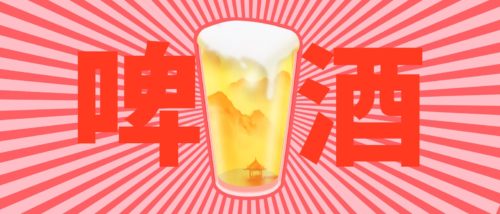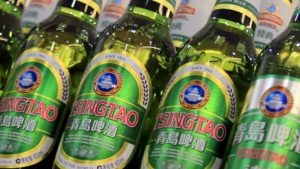The Chinese state enterprise behind Oatly, America’s hottest oat milk brand
Plant-based milk maker Oatly is planning a $1.6 billion Nasdaq IPO. What is the massive Chinese company that owns most of the trendy vegan brand?

Speculation is brewing around a Chinese benefactor of Oatly Group AB, the chic vegan milk brand that is taking America by storm and which has attracted investment from celebrities like Oprah Winfrey and Jay Z, along with Starbucks CEO Howard Schultz. Oatly was founded in Malmo, Sweden in 1994.
In an updated prospectus on Tuesday, the oat milk brand said it is raising up to $1.65 billion in a Nasdaq IPO. But the news also came with a surprise: Oatly’s largest shareholder is one of China’s flagship state-conglomerates, China Resources.
A joint venture between China Resources (华润 huárùn) and Belgian venture capital firm Verlinvest owns 55.9% of the darling vegan beverage. Even after the IPO, the Chinese-Belgian entity is expected to hold a commanding 47.6%. (By comparison, Blackstone Group, the second largest shareholder, would hold 6.7% after the offering.)
“We believe [Oatly] will be highly appealing to consumers in China,” said (in Chinese) China Resource’s Vice President of Strategy during a deal in 2016. “China Resources will continue to invest further in Oatly to ensure it remains the foremost oat milk brand.”
Oatly said in the IPO filing that China Resources — or, more specifically, its joint-venture China Resources Verlinvest Health Investment — will continue to “have significant influence over us after this offering, including significant influence over decisions that require the approval of shareholders.” Affiliates of the joint-venture are members of its board.
Compounding the ownership issue is a strategic one. Oatly has made clear its intention to lean into China where sales are soaring (in Chinese). Last year the company quadrupled its sales in Asia compared to the year prior. That will make the vegan brand ever more dependent on its largest shareholder. So what exactly is China Resources?
Oatly’s Chinese parent
China Resources is a state-owned conglomerate with businesses across Hong Kong and mainland China in industries including real-estate, construction, healthcare, and finance. Its consumer products division is a smashing success: China Resources Beer, one of its subsidiaries, is the largest homegrown brewery with 25% of China’s beer market. The brewer’s signature “Snow Beer” (雪花啤酒) is the top-selling beer in the world by volume.
In 2010, China Resources was involved in a corruption scandal that offered a rare glimpse into the shadowy workings of state enterprises. According to the New York Times, China Resources agreed to pay $1.6 billion for three coal mines in Shanxi Province, a deal so outrageously overpriced that it immediately set off red flags, with critics claiming that large sums were either squandered or improperly diverted. Additional details compounded the intrigue. The seller was Zhāng Xīnmíng 张新明, a businessman with a reputation for shady deals, and after the mines changed hands, no coal was being produced.
In 2013, a Chinese journalist singled out the chairman of China Resources, Charley Sòng Lín 宋林, as the main perpetrator behind the coal mine deal. After a government investigation into the senior executives of the company, Song was sentenced to 14 years in prison for corruption and bribery in 2017. Wáng Shuàitíng 王帅廷, the ex-general manager, was sentenced to 16 years.
By the accident of timing, the corruption scandal coincided with the ascendance of Xí Jìnpíng 习近平, who came to power in 2012 and immediately began a campaign to weed out corruption. China Resources became an unwitting test for the new leader’s resolve, and a symbolic victim of his anti-graft campaign.
China Resources traces its roots back to the days of the Chinese Civil War. It was established in 1938, in Hong Kong, as a financial backbone for Mao’s revolution. By 2020, it was the 19th largest Chinese company with $94 billion in annual revenues. As a state-owned entity, it is governed by the investment unit of the State Council, Beijing’s highest administrative branch. The corruption scandal in the 2010s exhibited the extent to which state-owned enterprises could be manipulated by strong personalities with the right connections. Yet it is unclear how the company has reformed since the anti-graft campaign.
Oatly in China
Oat milk, which was little known in the U.S. until the Swedish brand appeared in American grocery stores in 2017, is now America’s second-most popular plant-based dairy product after almond milk. The plant-based dairy category rose 20% last year in the U.S. in an era where healthier foods are prized by younger consumers.
But now, China is also catching the trend. “Chinese consumers are increasingly interested in plant-based foods,” said Oatly’s Asia President Zhāng Chūn 张春 in an interview (in Chinese) last fall when asked about Oatly’s rapid rise in the Chinese market. The enthusiasm for plant-based foods is undoubtedly part of a general health craze infecting the food and beverage sector. Genki Forest, a Chinese startup selling “zero sugar, zero carbs, zero fat” beverages, tripled its value in March to $6 billion after its latest funding round.
In April 2020, Starbucks announced the introduction of Oatly in all stores in mainland China. From January to April 2020, Oatly sales on Tmall and Taobao grew 115% and 2,306% (!) year-on-year, respectively. At present, China’s plant-based drinks are the fastest-growing beverage category, with a compound growth rate of 24.5% during the period from 2007 to 2016. The total size of the industry was $40 billion in 2020.
As the leader of China’s beer market and the owner of high-end supermarket chains Ole’ and BLT, China Resources will play a significant role in Oatly’s China expansion. But that may be a cause for investor concern. Recently, U.S. regulators and lawmakers have come down harder on China-affiliated firms amid rising accusations of fraud, and anxieties over national security. In March, the Security and Exchange Commission said it would begin to enforce the Holding Foreign Companies Accountable Act, passed in December, which could kick Chinese companies off of U.S. stock exchanges if they don’t comply with audit requirements.
Meanwhile, in China, state secrecy laws prevent China-based firms from disclosing auditing information to overseas entities. Oatly may eventually have to choose between a new crop of American investors or its old Chinese benefactor.
Jiahui Yue contributed reporting



